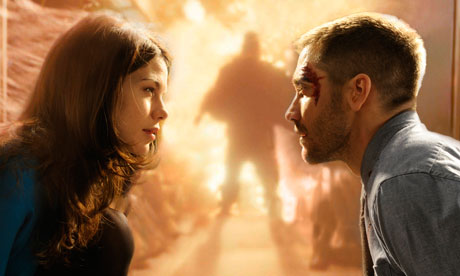 Ken and Ray, in f***in' Bruges.
Ken and Ray, in f***in' Bruges.A second viewing.
Oh, the beauty of style and substance. Stripping down the very essence of filmmaking and wherever which way you try to go around its principles, it will just bring you back to these simple words. "In Bruges", a slick crime comedy, a most surprisingly solid morality play and a meditative travelogue that explores the historical and religious significance of the much-preserved medieval sights of Belgium's Bruges, is an exemplary flag-carrier of the two nouns. It's like a film that could have been directed by Guy Ritchie but with an added strength by way of its thematic depth.
If the aforementioned British director, whose films I particularly admire but have never completely drooled and obsessed over, puts contemporary gangsterism into certain feats of absurdist twists of fates and distortion of events, "In Bruges'" director Martin Mcdonagh had, in some ways, also incorporated such playfully omniscient style into his characters but only as a superficially conscious device. Mcdonagh has put his two protagonists, Ken (the great Brendan Gleeson) and Ray (a revelatory performance by Colin Farrell which won him a Golden Globe) into the 'fairy tale-like' corners of Bruges because of a botched hit, which claimed the life of a child, but dared not to laugh at their predicament.
Sure, it's easy for the film to elicit sardonic smiles and chuckles from its audience judging from the scenario alone, which centers on the idea of two seemingly hardened criminals entrapped in an ennui-inspiring place, especially for people like them which the film has assumed to despise culture and history (such is not the case for Ken, it is for Ray). But unlike Ritchie's half-serious gangster films, "In Bruges" looks humorous only in its very surface. It is very distinct on the way it has conveyed the ever-recurring and ever-haunting notions of guilt and redemption without looking forced at the slightest bit. Maybe it's Brendan Gleeson and Colin Farrell's performances, maybe it is the freshness of the material itself, or maybe it is the brilliant cinematography, by Eigil Bryld, and musical score, by Carter Burwell. But to argue for each side would be very futile. Maybe, they just all work together perfectly.
And then there's Ralph Fiennes, whose portrayal of the rabid but highly principled gangster Harry Waters, the man who has sent Ken and Ray into the dreamy, cobble stone-laden streets of Bruges because of the latter's careless mistake, has caused many viewers to compare or even consider his performance as something of a homage to Ben Kingsley's unexpected turn as the unpredictable crime boss Don Logan in "Sexy Beast".
With the help of the film's great screenplay filled with trivial cues and modern conversationalist tones, which we just can't deny to have been influenced one way or another by "Pulp Fiction", Fiennes' character, which has the negative potential to be very caricature-like, passed off as somewhat believable and genuinely menacing in his distinct way.
We know of his principles, we know that he does not stand for killing innocent people, especially children, and we know that if some unexpected shit hits the fan, he won't think twice to fix everything himself and lull breakers of his code into an eternal sleep. His beliefs are forged of extremism, his methods violent but strangely understandable, his paradoxical impulse to kill someone who wrongly killed somebody is harshly immediate but completely undeniable.
Looking at the parallels of the film's themes with biblical concepts of hell, purgatory and the penance for sins, 'Bruges' might as well be both the purgatory and hell, and the penance for sins may be the film's depiction of the psychological manifestation of guilt, or may also be Harry himself, who just arrived, armed with a handgun and some 'dumdums', to collect.
"In Bruges" surely has been nothing but a sleeper hit more than 3 years ago, with the likes of "Slumdog Millionaire" and "The Dark Knight" taking over and dominating 2008's cinematic scene. Sure, that's also how I perceived this film at the time: A fascinatingly humorous, uniquely made crime film and nothing more (although I saw my 2008's top 10 movie lists on my old blog and saw it ranked at no. 3. I may just need to move it up a bit higher). But after rewatching it to once again witness its richly layered take regarding the context of existential woes, personal demons and bitter regret unfold in a beautiful ballet of humor and violence, it is, I can personally say, one of the greatest postmodern crime films in existence and simply put one of the decade's best films.
















